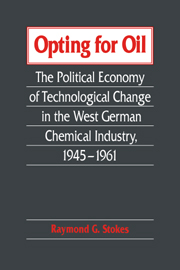Book contents
- Frontmatter
- Contents
- Preface
- Introduction
- Part I Background
- Part II Bargaining from strength: the political economy of technological change, 1949–1955
- Part III Alternative paths to plenty: case studies from the mid–1950s
- Part IV Consolidating the new regime, 1957–1961
- 10 Petrochemicals triumphant, 1957–1961
- 11 Conclusion
- Index
10 - Petrochemicals triumphant, 1957–1961
Published online by Cambridge University Press: 19 October 2009
- Frontmatter
- Contents
- Preface
- Introduction
- Part I Background
- Part II Bargaining from strength: the political economy of technological change, 1949–1955
- Part III Alternative paths to plenty: case studies from the mid–1950s
- Part IV Consolidating the new regime, 1957–1961
- 10 Petrochemicals triumphant, 1957–1961
- 11 Conclusion
- Index
Summary
The increasing economic disparity between the two German states that were created in the aftermath of World War II precipitated a severe political crisis in the late 1950s and early 1960s. One result of the widening gulf between them was a population hemorrhage from East to West, especially through Berlin, where the border remained open through the early 1960s. Those defections constituted a staggering blow to the German Democratic Republic (East Germany), which lost 2.5 million citizens, permanently, to the Federal Republic between 1949 and 1961. Nearly half of the émigrés were twenty-five years of age or younger. Important segments of the refugee flood had been well educated – many of them professionals. East Gemany was losing many of its most productive and creative people.
Naturally the East German government tried to stem the flow. In December 1957, a new law made “flight from the Republic” (Republikflucht) a criminal offense. In November of the following year, the Soviets agreed to help their Warsaw Pact ally resolve the crisis by issuing an ultimatum to the Western Allies that the status of West Berlin had to be clarified within six months. The climax of the growing tension came on 13 August 1961, shortly after midnight, when the East Germans began construction of the Berlin Wall. The fluid, unstable, and potentially extremely dangerous political-economic situation that had existed in the German Democratic Republic stabilized to a substantial degree following the erection of the Wall, at least until the regime's collapse in 1989–90.
- Type
- Chapter
- Information
- Opting for OilThe Political Economy of Technological Change in the West German Industry, 1945–1961, pp. 233 - 243Publisher: Cambridge University PressPrint publication year: 1994



